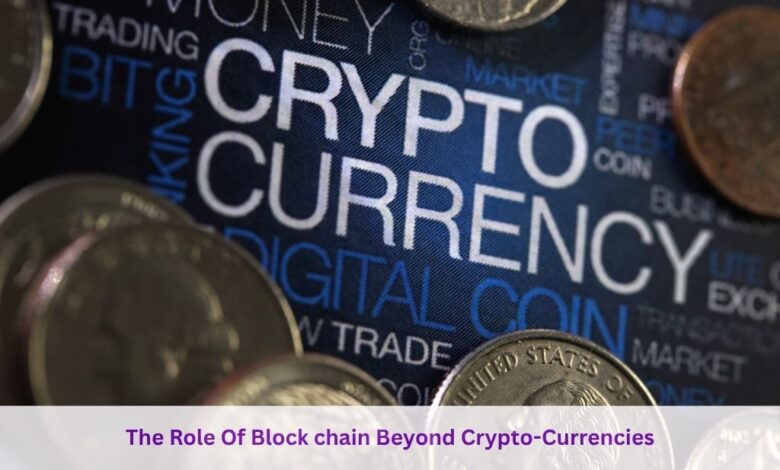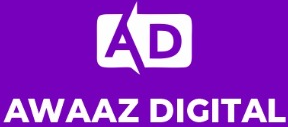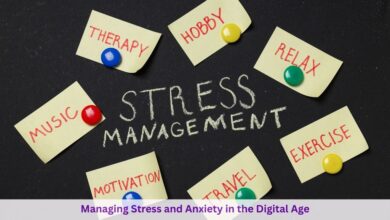The Role Of Block chain Beyond Crypto-Currencies

Often hearing the word blockchain, people immediately connect it to Bitcoin, Ethereal, or the wider realm of cryptocurrencies. Although blockchain is truly the underlying technology underpinning these digital currencies, its worth and possible reach go far beyond the field of cryptocurrency. Actually, blockchain is softly transforming sectors, changing conventional systems, and providing answers to issues we have been fighting with for decades. Then what exactly is blockchain and how could it be applied outside of merely powering cryptocurrencies? Let’s go investigation.
Comprehension of blockchain in plain language blockchain is fundamentally a decentralized and distributed digital ledger that records transactions in a safe, transparent, and tampering-proof manner. Hence the moniker, each record or “block” is related to the one before it to create a “chain. ” Once data is recorded, it cannot be changed without modifying all following blocks; this calls network consensus.
This makes blockchain by design immune to data manipulation, hacking, or fraud. Why Blockchain Issues Beyond Cryptocurrency The enchantment of blockchain is found in its trust less system of recording of information rather than in coins or tokens. The system itself ensures the integrity of the data; you do not need to trust a single power or outside party.
To increase openness, efficiency, and trust, this basic but potent idea is now being applied in many different industries. Let us investigate more closely the ways blockchain is already transforming beyond currency:
- Supply Chain Clear-Cutness
From raw material suppliers and producers to logistics firms and merchants, the supply chain sector includes many stakeholders. Lack of visibility, delayed documentation, and the risk of fraudulent products abound in conventional supply networks. By giving a permanent and open record of a product’s path from source to final consumer, blockchain changes this scene. For instance, a coffee company could employ blockchain to follow beans from a particular Colombian farm to your neighbourhood coffee shop via the roasting and packaging process. Advantages consist in: Slightly less counterfeiting. Better compliance with ethical sourcing and environmental rules Companies like IBM and Walmart have already used blockchain in their supply chain to monitor food safety, therefore lowering the time required to trace contaminated goods from weeks to seconds.
2. healthcare information management Worldwide healthcare systems battle with data privacy problems, segregated information, and siloed data. Blockchain gives patients control over who has access to their information and offers a means to safely manage and share health records. Consider a patient migrating from one country to another. Their blockchain-based health profile might travel with them encrypted, comprehensive, and always current rather than fighting with transferring medical records. Among real-world uses are: doctor-to-doctor secure sharing of patient records Checking the genuineness of medicines Follow-up of clinical trials and research results Blockchain helps to cut costs and improve healthcare results by lowering bureaucratic mistakes and increasing confidentiality.
3. Methods of Vote
Global worry is election security. Often vulnerable to modification, fraud, or lack of openness are conventional voting systems. Blockchain technology could present a safe and open voting method guaranteeing every ballot is tallied and properly counted. In a voting system founded on blockchain: Voters get a special, encrypted digital identity. Votes are cast and logged on the blockchain. The ledger guarantees that votes cannot be removed, duplicated, or modified. Some countries and businesses have already trialled blockchain voting solutions. For example, in 2018 West Virginia carried out a blockchain-based mobile voting experiment for members of the armed forces abroad. Although not without difficulties, the idea promises to boost voter turnout and faith in democratic systems.
4. Land Title Management and Real Estate
Purchasing or selling real estate requires a mountain of paperwork, title deeds, brokers, and a lot of waiting. Due to bad recordkeeping, double-selling of land and fraud are also very common in some countries. Blockchain helps to guarantee transparency and lowers the possibility of fraud by allowing digitized ownership records to be kept safely. An immediate proof of ownership, streamlining of transactions, and even legal cost reduction is a land title recorded on blockchain. Countries such as Georgia and Sweden have already started using blockchain for land records, therefore speeding up land transactions and reducing corruption.
5. Digital Identity Verification
In today’s digital world, proving who you are is a big challenge. Password may be breached. Stolen personal information is possible. Blockchain enables the development of secure digital identities under total user control no more dependency on hacked central systems. With blockchain-based identification: You possess encrypted identification data. You choose who and when to reveal your qualifications. Impersonating you is nearly impossible for anybody. Banking, healthcare, education, even border control might all make use of such identities. For individuals in poor nations without formal identification particularly, blockchain may let them use services from which they were previously barred.
6. Intellectual Property and Copyright Safeguard
Often finding difficulty establishing ownership of their work and making certain they are appropriately paid, creators from artists and writers to musicians and filmmakers Blockchain gives a method to register original content with time stamped evidence of ownership. With smart contracts, artists can even get paid automatically every time their work is used or sold. An artist, for instance, could get royalties in real-time any time their song is bought or streamed on a blockchain platform. This has the potential to transform sectors where unfair royalty distribution and content theft are significant issues.
7. Microfinance and financial inclusion
Blockchain may empower the unbanked population billions of people globally without access to conventional financial systems even without crypto currencies. Blockchain can: enable low-fee money remittances Enable micro-loans using smart contracts. Create confidence in community-based lending programs. Using blockchain, projects like Banquo are building financial identities for farmers and workers in developing nations, therefore enabling their access to credit, reasonable compensation, and financial history.
8. Trading and Management of Energy
Consider if homes with solar panels could sell surplus power straight to neighbours rather than returning it to the grid. Peer-to-peer energy trading is made possible by blockchain in a distributed network. Every energy unit can be tokenize, followed, and safely traded. This promotes local energy economies and increases renewable energy availability. Already running pilot projects to explore blockchain energy markets, nations like Germany and Australia let houses and companies trade electricity on a safe, transparent platform. difficulties and constraints. Though blockchain has great potential, it is not a cure-all.
Considerable obstacles still must be overcome: Scalability: Quick handling of large numbers of transactions can be difficult for current blockchain. Energy Use: Some agreement methods, such Proof of Work, need staggering amounts of electricity. Regulatory ambiguity: Governments are still working to manage blockchain-based systems. Existing systems may require significant revisions to properly integrate blockchain.
Moreover, adoption could be slowed down by the lack of user understanding and high development expenses. For widespread use, blockchain solutions have to be user-friendly, reasonably priced, and scalable.
Drawbacks and difficulties
Though blockchain offers great potential, it is not a panacea. Notable obstacles that need attention include: Scalability: Processing a great volume of transactions quickly presents problems for modern blockchain. Energy usage: Certain agreement methods, such Proof of Work, use a lot of energy. Government are still trying to learn how to manage blockchain-based systems, hence there is regulatory uncertainty. Problems with integration: Effective blockchain integration may need major overhauling of current systems. Furthermore delaying acceptance can be the lack of user knowledge and excessive development expenses. To reach widespread adoption, blockchain solutions need be scalable, cost-effective, and user-friendly.
The Road Ahead
Though obstacles exist, blockchain is gradually moving past the shadows of cryptocurrencies. Industries are experimenting, innovating, and expanding on this technology in ways that could change the course of anything from personal identity to business to administration. We are likely to see more creative, secure, and transparent systems surface in the next ten years as developers improve blockchain platforms and companies discover how to use its whole capacity. In several respects, we are still at the beginning of the blockchain revolution. It might take time to find its footing, just like the internet in the early 1990s, but once it does it might be a regular element of our life. Blockchain in Academic Integrity and Education Another area where blockchain is quietly but forcefully progressing is education.
Blockchain provides a solution in a time when academic credentials can be counterfeited and degree fraud is becoming more prevalent by way of safe digital certificates and records. Storing degrees, diplomas, and transcripts on a blockchain enables institutions to give graduates with tamper-proof, verifiable credentials that employers and other colleges may immediately confirm. This helps to lower administrative load and stop fraud in addition to simplifying the verification procedure. Furthermore, blockchain can be employed to register course completions, skill acquisition, accomplishments, and even extracurricular activity involvement hence generating a complete and lifelong learning passport for every student.
Without the need for expensive and time-consuming paperwork, these records may track pupils throughout colleges, employment applications, or perhaps national boundaries. Maintaining academic honesty in research is another interesting use case. Blockchain can track the progress of scientific studies, manage versions of papers, and timestamp research data, therefore facilitating the detection of data tampering or plagiarism. Universities and research centres could employ blockchain to guarantee transparency in funding, methods, and publishing dates. Blockchain also unlocks the door to decentralized learning systems wherein students worldwide can access excellent content, get certifications, and safely store their progress without depending on one school or main network.
This can be quite transforming in areas where conventional education is scarce or erratic. Blockchain provides a reliable foundation to promote transparency, equity, and lifelong learning as education grows more digital and international, therefore empowering both students and instructors and giving them more control and confidence in the academic path. Ultimately Ideas , Blockchain is more than Bitcoin. An fundamental technology able of transforming our life, work, trade, and trust is this one. From supply chains and healthcare to energy, identity, and governance, the genuine revolution is in decentralization and trust less cooperation rather than digital currency. One thing is obvious as we keep discovering its potential: blockchain has emerged from the shadows of crypto and is here to remain.




